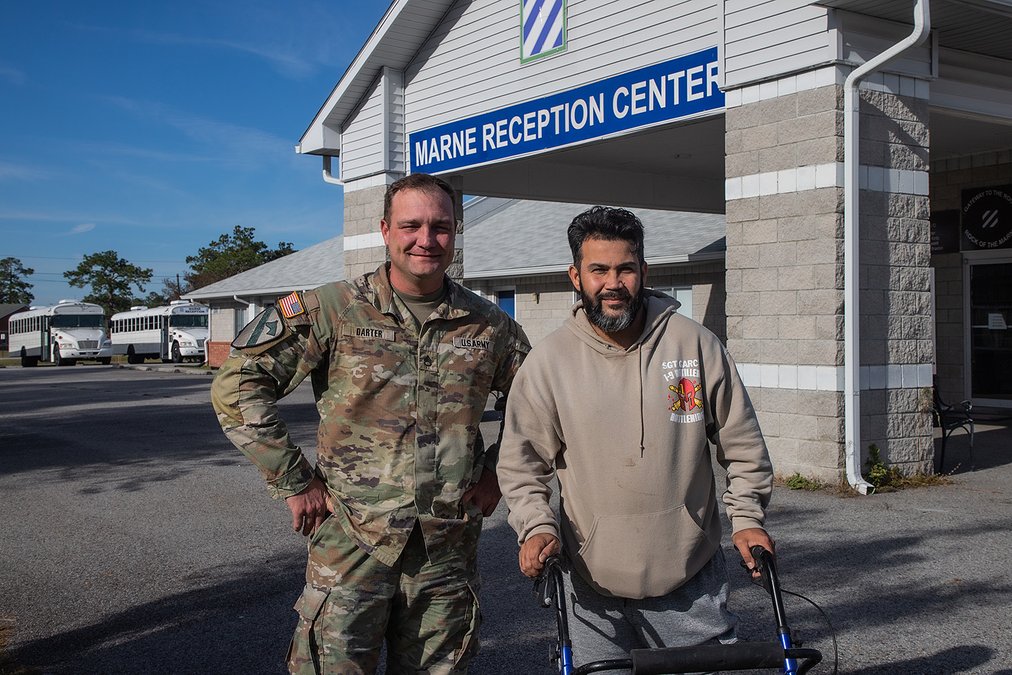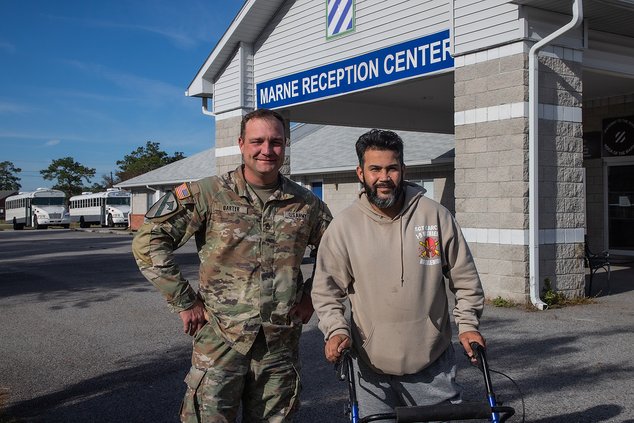Soldiers in the U.S. Army are trained extensively on how to save a life. Soldiers are taught Combat Life Saver, or CLS courses, which instruct non-medical soldiers on first aid and trauma care.
This training often makes the difference between life and death. However, what does one do when a medical crisis occurs not in combat, but in their own neighborhood?
Two soldiers, both driving in Elim, encountered this scenario on Sept. 6, 2023, when one of them nearly lost their life.
Sgt. Mark Garcia, a prior active duty soldier who had recently transitioned to the National Guard, was going through the motions of a seemingly typical day. He was driving home with his son after picking him up from football.
While turning along a curve in the road, he suddenly realized another driver had strayed into his lane and he had no time to react.
“I saw the lady coming down the road into oncoming traffic,” he said. “I tried to avoid her, but she ended up colliding with me.”
Staff Sgt. Todd Darter, Garcia’s friend and neighbor who once served with him, saw the crash occur. Darter was also driving on the same road with his son at the time. Despite not yet recognizing his friend’s car, he realized the need to act.
“I realized as I’m running up to his car, ‘Hey, wait a second, this is my neighbor,’” Darter said. “I know this guy, we were in 1-9 FA together; he was one of our mechanics.”
Garcia and his son were both unconscious as Darter ran up to the window. Recalling his previous CLS training, he sprang into action.
“I was just going back through the steps of CLS,” Darter said. “Trying to get everybody responsive and start assessing.”
Having not seen any major injuries to Garcia’s upper body, Darter could still tell he was losing a lot of blood. That’s when another person, who had arrived and helped to keep the son conscious, pointed out the gash in Garcia’s left leg.
He had an arterial bleed. Recognizing how severe the situation was, Darter quickly ran back to his car, searching for something to stop the bleeding.
“I knew I had a tourniquet in my car somewhere,” Darter said. “I swept across the back seat and found it and grabbed it.”
After securing the tourniquet to Garcia’s leg, Darter continued to keep him and his son engaged and responsive until medical personnel arrived. As soon as they did, he immediately informed them about the injuries. Once a helicopter evacuated Garcia, Darter went on with his life, seeking no praise for his heroic actions.
“I had to hear about this from some sergeant first class who I’d never met,” said Cpt. Justin Kintz, Darter’s commander. “I asked him why he didn’t say anything and his reaction was just, ‘why would I say anything?’”
Kintz then elaborated on what this response meant to him.
“He wasn’t motivated by personal gain, personal gratification, personal anything,” Kintz said. “Somebody just got hurt and he wanted to help.”
Despite his life-threatening injuries, Garcia has since regained his ability to walk again after being released from the hospital. His son is also doing well.
“I spent about two or three weeks in a trauma unit,” Garcia said. “Sergeant Darter, he’s been checking on me ever since.”
Darter was sure of the importance of his training in handling the situation. Because of the number of times he’d gone through CLS courses, his reaction was muscle memory.
“I’ve been through, I don’t know, a thousand plus CLS classes,” Darter said. “Everybody treats CLS as kind of a vacation from the unit, but it really works. It really does.”
Kintz is now in the process of ensuring Darter is recognized for his actions. However, this is not without recognition of the importance of his training in saving a friend’s life.
“Take your CLS class seriously,” said Kintz. “Because you never know when you’re going to need it.”
Training proves vital as Marne soldier saves friend’s life


Sign up for our e-newsletters